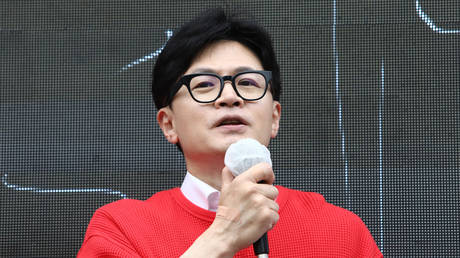Chief of South Korea's Ruling Party Resigns
The leader of South Korea's ruling People Power Party (PPP) has declared his resignation following the impeachment of President Yoon Suk Yeol.. source:TROIB RTS

The leader of South Korea’s ruling People Power Party (PPP), Han Dong-hoon, has announced his resignation following the impeachment of the nation’s president, Yoon Suk Yeol.
On Saturday, the South Korean parliament voted to impeach Yoon due to his decision to briefly declare martial law in early December, with some members of the president’s PPP supporting this action.
“I am stepping down as the leader of the People Power Party,” Han said during a press conference at the National Assembly on Monday.
He explained that it has become “impossible” for him to perform his duties with all five members of the PPP’s Supreme Council indicating their intention to resign in light of Yoon’s impeachment.
“Although I sought alternatives to impeachment, I was unable to find any other resolutions. I am to blame, and I am sorry,” the party leader stated.
The PPP had initially boycotted the first vote on Yoon’s impeachment on December 7, hoping to persuade him to resign voluntarily. However, after the head of state refused, Han changed his position, declaring that impeaching Yoon was the only method to protect democracy in South Korea.
During the press conference, the PPP leader, who has held his position since July, mentioned that he has “no regrets” about supporting the crackdown on Yoon. He emphasized that the declaration of martial law was wrong and “illegal” even though it was “imposed by a president from our party.”
Following Han’s resignation, the newly elected floor leader of the PPP, Kweon Seong-dong, will assume the role of acting head.
The political crisis in South Korea began on December 3, when Yoon delivered a surprise televised address announcing emergency martial law, claiming that the opposition—whom he accused of being sympathetic to North Korea—was allegedly preparing a “rebellion.” He did not provide evidence to substantiate his assertions.
Within hours, 190 lawmakers, who accessed the National Assembly despite military barriers, voted unanimously to lift the martial law decree. Thousands of citizens protested against the president’s actions on the streets.
Less than six hours after declaring martial law, the president retracted his decision.
Last week, Yoon, who is under investigation for potential insurrection, defended his martial law declaration as a “highly calibrated political judgment,” vowing to “fight” against any attempts to impeach or investigate him.
On Monday, South Korea’s Constitutional Court began reviewing the impeachment case to determine whether Yoon should be removed from office. Investigators have indicated they plan to question Yoon later this week.
Debra A Smith contributed to this report for TROIB News












